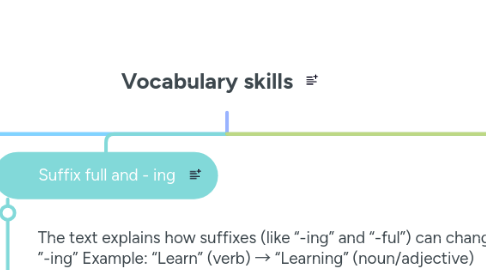
1. Word forms
1.1. Word :noun/verb some words are both nouns and verb but they work differently in a sentence. Examples:
1.1.1. Work ( noun) : there are many kinds of work. (When “work” is used as a noun, it refers to a general concept, such as a job, task, or the effort someone . It acts as the object of the preposition “of.” )
1.1.2. Work ( verb) : I work in a large hospital. It describes the action that the subject (“I”) is performing (being employed or doing a job).
2. Words roots
2.1. The root is the basic part of the word which carries the meaning. Learning the roots with the memory can help you understand each new word.” This context focuses on how memory plays a role in learning word roots to build vocabulary
2.1.1. 1. Memory (Noun): The mental ability or the stored information. Example: “My memory of the event is very clear.” It’s the foundation for the other words—it’s the capacity or content you work with
2.1.2. 2. Memorize (Verb): The action of storing something in your memory. Example: “I will memorize the list of word roots.” It’s the process of creating a memory.
2.1.3. 3. Remember (Verb): The action of recalling something from your memory. Example: “I remember the meaning of the root ‘spect.’” It’s what you do after memorizing—retrieving the information.
2.1.4. 4. Memorial (Noun/Adjective): A physical or symbolic thing created to honor a memory. Example: “The memorial statue reminds us of the historical event.” It’s an external way to preserve a memory, not a mental process.
3. Suffix full and - ing
3.1. The text explains how suffixes (like “-ing” and “-ful”) can change the form and meaning of a word, such as turning a verb into a different form or a noun into an adjective. Examples ”-ing” Example: “Learn” (verb) → “Learning” (noun/adjective) As a noun: “The learning of word roots helps me.” (The process of learning.) * As an adjective: “This is a learning experience for all of us.” (An experience related to learning.) * Explanation: The suffix “-ing” changes the verb “learn” into a noun (gerund) or adjective. It allows the word to describe the act of learning or something associated with learning. * ful” Example: “Beauty” (noun) → “Beautiful” (adjective) * “The sunset was beautiful.” (Describing the sunset as having beauty.) * Explanation: The suffix “-ful” changes the noun “beauty” into an adjective, “beautiful,” meaning “full of beauty.” It allows the word to describe another noun (like “sunset”).
3.1.1. ing” Example: “Teach” (verb) → “Teaching” (noun/adjective) As a noun: “The teaching of vocabulary skills improves students’ understanding. As an adjective: “A teaching method makes learning fun. ful” Example: “Joy” (noun) → “Joyful” (adjective) “The children were joyful during the festival.
4. W orking with a vocabulary exercise from a dictionary or language learning resource, focusing on distinguishing between words with similar meanings, like “work” and career.
4.1. Happy: Feeling or showing pleasure or contentment; a general state of satisfaction (e.g., I’m happy with my new phone). Joyful: Feeling or expressing great happiness, often with a deeper, more intense emotional quality (e.g., a joyful celebration).
5. Interpret the Meaning” section from a vocabulary skills book. This section explains how to interpret the meaning of words using context.
5.1. Example:Despite the torrential rain, the football match continued, and the players were soaked within minutes.
5.1.1. Guess the Meaning of the Word The new word here is “torrential”. From the context
5.1.1.1. Understand the Situation: The rain was very heavy
5.1.1.1.1. Answer a Question If the question is: “How did the weather affect the players?” From the context, we can answer that the weather made the players completely soaked and likely made playing more difficult due to the heavy rain.
